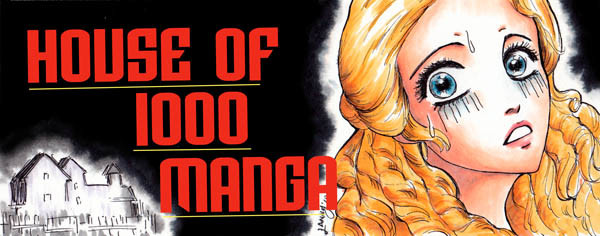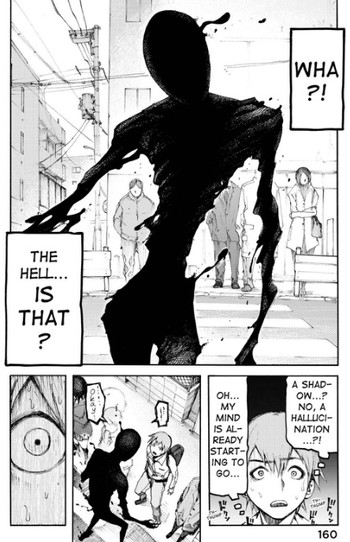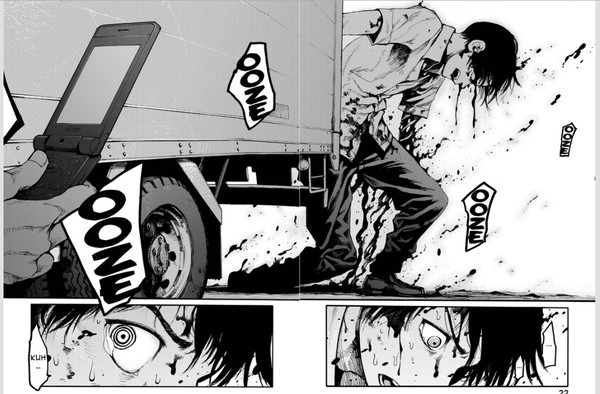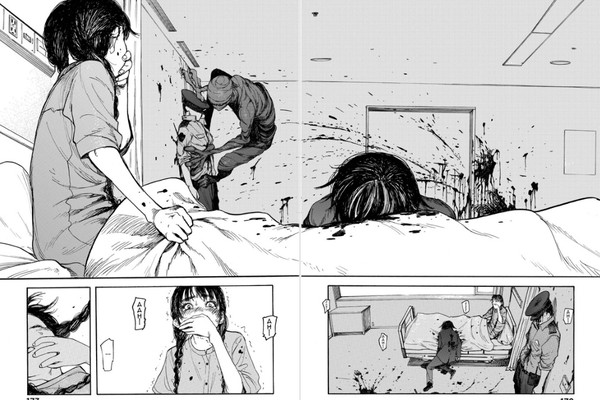House of 1000 Manga
Ajin
by Jason Thompson,

Ajin

Immortality would be great, wouldn't it? It's got to be just sour grapes that there are so many stories about how bad immortality would be, all the way back to ancient myths like the Greek hero Tithonus, the first person to suffer the mistake of wishing for immortality without eternal youth. Of course, even if you don't age, you might find that given infinite time, everything becomes meaningless and you eventually lose all human identity, like in Jorge Luis Borges' The Immortal.Less existentially, there's the terrible consequences of being immortal but still getting maimed and mutilated, like in Torchwood: Miracle Day or L. Frank Baum's later, weirder Oz books. Baum establishes that in Oz you can't die, which sounds great at first, but leads to sequences like this one, when some soldiers are being hunted by a monster called a Rak:
The officers now began to groan and to tremble, but Files tried to cheer them, saying:
"It may not be a Rak, after all, that we see approaching us, and you must not forget that we people of Oogaboo, which is part of the fairyland of Oz, cannot be killed."
"Nevertheless," said Captain Buttons, "if the Rak catches us, and chews us up into small pieces, and swallows us—what will happen then?"
"Then each small piece will still be alive," declared Files.
"I cannot see how that would help us," wailed Colonel Banjo. "A hamburger steak is a hamburger steak, whether it is alive or not!"
There's hundreds of manga about immortals, of course, like Immortal Rain, 3x3 Eyes, Trigun and Kieli. But with a few exceptions (like Rumiko Takahashi's Mermaid series), they're usually depicted as emo superheroes, one-of-a-kind elites whose loneliness is offset by their super-awesome ability not to die. And like vampires, they usually manage to stay hidden; there aren't so many stories about how society would react to large numbers of immortals (except Torchwood: Miracle Day, but bleagh), or what it'd really be like if unkillable people started walking around in the present day.
Enter Ajin, a recent manga that just started in 2012.Licensed by Vertical for a Fall 2014 release and currently available on Crunchyroll Manga if you can't wait that long, it's a gritty, bloodsoaked story of unkillable immortals on the run from a society of humans that hates and fears them. The first Japanese volume was credited as a collaboration between author Tsuina Miura (author of the survival horror manga High-Rise Invasion, available from Mangabox) and newbie artist Gamon Sakurai, but starting from volume 2, Miura's name is gone and it's all credited to Sakurai, with no explanation. Regardless of who wrote it, it's got great art, clever suspense scenes, and a splatter (but not, say, Tetsuya Sarawatari level) of gore.
The first "Ajin" was discovered 17 years ago. Colloquially known as "demihumans" (the title could also be translated as "subhuman," which while also not a perfect translation, at least wouldn't make me think of orcs and halflings), they are seemingly identical to normal humans except for one thing: they cannot die. When fatally injured, they instantly regenerate, regrowing lost tissue and nutrients from nothing. (Also, one other thing: they can emit a piercing ultrasonic scream.) Their discovery shocks the world, but has little impact on most people's lives, they are so extremely rare. The 46 known Demi-Humans are hidden away in research laboratories out of public view, used for medical research based on the idea that studying Demi-Humans, like stem cell research, might hold the key to saving thousands of lives.
Kei Nagai, a high school student born after the discovery of Demi-Humans, sits bored and half-listening through his teacher's explanation of what they are. He's still not paying attention later in the day, when a truck runs him over while he's crossing the street…and, moments later, he rises up uninjured from the puddle of guts and blood. Kei Nagai is the 47th Demi-Human. His neighbors, friends and family look on him with shock and awe, but soon that shock turns to fear and greed: Demi-Humans aren't human beings. They have no rights. When the rumor spreads of a 100 million yen reward for capturing a Demi-Human, Kei flees in terror, pursued by everybody. ("We've got to capture it!" "You need to listen to your human masters!")
The only person Kei can trust is one unexpected friend…Kai, a 'weirdo' from a bad family, a kid who Kei himself used to ostracize. Kai is the only one to extend Kei a helping hand, and soon they're fleeing on Kai's motorcycle towards a remote area of Kyushu, the only place where he might be able to live without fear of capture. But trouble waits on the road, and soon Kai and Kei part ways. (Their separation is so sudden, I wonder if it had anything to do with original author Tsuina Miura's departure.) Throughout his journey, Kei is hunted by the Demi-Human Control Commission led by cold-blooded, ruthless Tosaki. But soon he meets unexpected…allies?…in the form of other Demi-Humans. To the others, life and death is like nothing more than a video game, and they have grown inured to the agonizing pain of repeated deaths and resurrections. Furthermore, they have discovered the deeper powers of a Demi-Human, the power to summon what is known as "the black ghost."
Ajin is full of twists and turns, but since they're are right on the front cover of the first volume of the manga, it's not a spoiler to reveal: Demi-Humans aren't just immortal, they also have Stands. The "ghosts," like eyeless black mummies, are invisible creatures somehow spawned and controlled by the Demi-Humans' essence, as if immortality wasn't powerful enough. The manga makes a good try of providing a scientific explanation for the "ghosts," and tying it in with the Demi-Humans' regeneration powers, but (at this point in the story at least) it's still a sometimes awkward connection, as if Aquaman also had the powers of Dr. Strange. OTOH, they do look cool. And of course, such seemingly terrifying powers are only the shallows of even deeper depths, powers the government refers whisperingly to as "the Shinya Nakamura incident" and "the nightmare scenario"…
Most of the manga, however, is just about being immortal and unkillable, and the questions that arise from that: how do they regenerate? What happens if they're cut into multiple pieces? What about poison/fire/drowning/starvation/stuffing all their dismembered bodyparts into tiny post office boxes too small to fit a regrown human body? The government discovers that best way to capture a demi-human is to use tranquilizer guns, because they can be knocked unconscious, whereas if you shoot them in the head they'll just grow a new head and get up seconds later. Demi-Humans' severed bodyparts don't vanish when they grow new ones, so one Demi-Human raises money by selling bulk hearts, kidneys and livers on the black market. And of course, if you regenerate, being a suicide bomber is easy. The way the Demi-Humans cleverly use their powers to outwit the human authorities, and the humans try to suppress the Demi-Humans, reminds me of Death Note. Do Demi-Humans have a weakness? Not quite. But one chapter reveals the dark secret that, although you can't kill a Demi-Human, you can kill the person that is the Demi-Human…the horrible fate of feeling your own consciousness fade into permanent death while your body, your immortal body, lives on…
There's one major difference between Death Note, a shonen manga, and Ajin, which ran in a seinen magazine. Death Note operates from the default shonen assumption that the human race is basically good (all the detectives are so deeply moral, they can barely even bring themselves to use guns, even against a bad guy who's killing thousands of people), whereas in Ajin, humanity is the enemy and amorality is the rule. The narrative repeatedly drives home the pessimistic idea that the vast majority of people are so apathetic and/or uninformed they don't know or care what kind of abuse happens to Demi-Humans; Keisuke Nakajima, the only one of Kei's classmates who feels some moral outrage at Kei's treatment, is completely alone ("These horrible things are happening…and yet everyone acts…like nothing…"). Whether this seems realistic depends on your level of cynicism, and perhaps on whether you think of Demi-Humans as a metaphor for a besieged but visible minority (like, say, the LGBT community) or as a forgotten group that almost no one in America sympathizes with (like, say, Guantanamo Bay inmates). Even Kei's family is unsympathetic. Perhaps most disturbingly, as the manga goes on, Kei himself begins to demonstrate moments of shocking amorality: "I guess there's an upside to dealing with humans. I just have to kill them. They can't even come back to life." "There are a lot of humans who deserve to die." To fight against cruelty might require becoming even crueler. As the story goes on, Kei's questionable morality and empathy (like that old Spider-Man line: "With great power comes great responsibility") becomes the true unknown element on which everything hinges.
So that's what's good about Ajin; what's wrong with it? Some reviewers find Kei too unsympathetic. (Perhaps Japanese readers didn't like him either, because as the manga goes on the story increasingly starts to be seen from other perspectives.) The black ghosts don't quite mesh with the immortality theme; it's ambitious to create a manga about both semi-material spirit helpers and immortality and handle both elements realistically. It's not as densely plotted as Death Note, and there's times when the reader can out-think the author, going "But why didn't they do this---?" or "But that plan totally wouldn't have worked if ----". But at other times there's great moments, impossible heists and plot twists that come off like a charm, complicated moment-by-moment battles between lone Demi-Humans and dozens of heavily armed soldiers and mercenaries. It reminds me a lot of Jason Shiga's webcomic Demon, which (spoilers) is also about a situation a bit like Ajin, although the hero's powers are even more brilliantly simple. Do immortals age? What happens if they have children, are they immortal too? Will the environment eventually collapse because of immortals eating everything and all their rotting bodyparts clogging the place? I hope Ajin runs long enough to find out.
discuss this in the forum (14 posts) |


